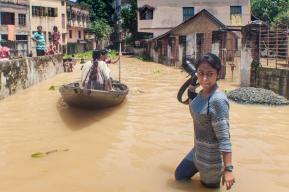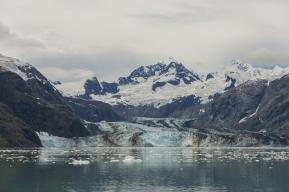مقال
المناخ، موضوع قانوني جديد

يتواصل ارتفاع عدد المواطنين والمنظمات غير الحكومية الذين يقرعون أبواب المحاكم لالتماس العدالة المناخية. ويجدر توجيه الاهتمام لهذا الكمّ غير المسبوق من القضايا العدلية المُسجّلة في الفترة الأخيرة. فهي تكون الرأي العام وتُمثّل نوعا من الضغط على الدولة والمؤسسات الصناعية، من شأنه أن يخرجها من سباتها.
بقلم آن-صوفي نوفل
مع مر السنين، يتواصل ارتفاع درجات الحرارة ليبلغ كل سنة أرقاما قياسيّة. وتستأنف الغازات الدفيئة مدها المتصاعد، ويتربص القلق والتذمر سكان العالم أمام قلّة تفاعل الدول. النتيجة: ارتفاع هام في عدد الشكاوى العدلية ضد الامتناع عن التحرك إزاء المسألة المناخية.
تم تسجيل أول حالة من هذا القبيل في هولندا سنة 2013. رفعت مؤسسة أورجندا قضية ضد الحكومة بسبب «عدم اتّخاذها الإجراءات الكافية للحدّ من انبعاث الغازات الدفيئة المتسبّبة في تغيّرات مناخية خطيرة». كانت تلك البلاد آنذاك مصنفة من بين البلدان الأكثر إنتاجا للتلوّث في الاتحاد الأوروبي، وقد طالبتها المؤسسة بالعمل على تخفيض الانبعاثات في البلاد بنسبة تتراوح بين 25 و40% في حدود سنة 2020 (مقارنة بمستويات سنة 1990). وفي 24 يونيو 2015، حكمت محكمة إقليم لاهاي لفائدة أورجندا – وقد تمّ تأييد هذا الحكم في 9 أكتوبر 2018 من طرف محكمة الاستئناف بلاهاي اعتمادا على وقائع أثبتها العلم وحسب المبدأ القديم الداعي إلى وجوب عناية الحكومة: وعليه، في أفق سنة 2020، يجب تحقيق تخفيض في نسبة انبعاثات ثاني أكسيد الكربون في هولندا بـ25% على الأقل. ونظرا للاعتراف بكونها أول قضية حول المسؤولية المناخية في العالم، مثل هذا الحكم سابقة أثارت قضايا أخرى في كامل أنحاء العالم.
وفي 5 أبريل 2018، أتى الدور على كولومبيا حيث قضت المحكمة العليا لفائدة 25 شابّا قاضوا الدولة لعدم ضمانها لحقوقهم الأساسيّة في الحياة والبيئة. وبمرافقة من المنظمة غير الحكومية ديجستيسيا، حصلوا على أمر من المحكمة مُوجّه إلى الحكومة وإلى ولّاة مختلف الأقاليم وإلى البلديات بوضع خطّة عمل للمحافظة على الغابة، مع التذكير بوجوب حماية الطبيعة والمناخ باسم الأجيال الحالية والأجيال القادمة.
قبل ذلك بقليل، وفي نفس السنة في النرويج، لم يكن الحكم لصالح المُشتكين بهذه الدرجة: فقد سبق أن اعترضت المنظمتان غير الحكومية غرينبيس نورديك والطبيعة والشباب، سنة 2015، على فتح مناطق جديدة لاستغلال النفط والغاز في بحر بارنتس في محيط القطب الشمالي الذي يعد من بين النظم البيئية الأكثر هشاشة في العالم. لكن محكمة أوسلو اعتبرت أن التنقيب الجديد لا يتعارض مع الدستور النرويجي، فارضة على المنظمتين دفع مبلغ 580.000 كرونة نرويجية (66.100 دولار) لفائدة الدولة بعنوان تكلفة المقاضاة...
وفي نفس سنة 2015 في الولايات المتحدة، رفع 21 طفلا ومراهقا، بمعية جمعية آور شيلدرنس ترست (ثقة أطفالنا)، قضية أمام محكمة أوريغون لمطالبة الحكومة الفدرالية الأمريكية بتخفيض نسبة انبعاث ثاني أكسيد الكربون بنسبة هامة، على أساس اختراق حقوقهم الدستورية (التنقيح الخامس) في الحياة، وفي الحرية، وفي النظافة. وقد تمّ تجميد هذه القضية التي أُطلق عليها اسم «الشباب ضد الولايات المتحدة» منذ 2018 من طرف المحكمة العليا.
في المقابل، وفي نفس السنة في باكستان،استجاب القُضاة لطلب فلّاح بإجبار الدولة في هذه البلاد المُتضرّرة من احترار المناخ، على اعتماد تشريع مناخي يحفظ مزرعته ويضمن حقّه في التغذية وفي الحصول على الماء.
في فرنسا، أول منازعة من هذا القبيل بادرت بها في ديسمبر 2018 جمعية «شأننا جميعا» مع ثلاث منظمات غير حكومية أخرى (أوكسفام، غرينبيس ومؤسسة نيكولا هولو): وقد تم تقديم خمسة مطالب في هذه المبادرة التي سميت بـ«قضية القرن»: تسجيل المناخ في الدستور، الاعتراف بتغيّر المناخ كجريمة إبادة بيئية، تمكين المواطنين من الدفاع عن الرفاهة المناخية أمام القضاء، التقليص من انبعاثات الغازات الدفيئة، تعديل نشاط الشركات متعددة الجنسيات وإيقاف الدعم للطاقة الأحفورية. وبمساعدة العديد من الأوساط المُؤثّرة، لاقت العريضة نجاحا منقطع النظير إذ حصلت على أكثر من مليوني توقيع خلال بضعة أسابيع.
وأمام صمت الحكومة الذي تواصل إلى غاية مارس 2019، رفعت المنظمات غير الحكومية قضية. ورغم يقينها بأن القضية ستتطلّب الكثير من الوقت، فإنها تأمل في تحسيس السكان على نطاق واسع وترويج قناعتها بأن العدالة تمثل حافزا هاما للإجبار على التحرّك.
على المستوى الأوروبي، رُفعت أول قضية من طرف عشر عائلات من ثماني دول (فرنسا، البرتغال، رومانيا، إيطاليا، ألمانيا، السويد، كينيا، فيجي) في مايو 2018. وفي هذه القضية التي أُطلق عليها اسم «بيبلز كلايمت كايز»، قاضى المشتكون كلّا من البرلمان الأوروبي والمجلس الأوروبي أمام محكمة العدل للاتحاد الأوروبي بسبب ترخيصهما بصفة مبالغة في مستوى انبعاثات الغازات الدفيئة. وحسب البيان الصحفي الصادر عن «بيبلز كلايمت كايز»، طالب المشتكون من الاتحاد الأوروبي الترفيع في طموحاته بشأن التخفيض من انبعاثات الغازات الدفيئة إلى نسبة -55% في أفق سنة 2030 مقارنة بسنة 1990، بدل نسبة -40% المُحدّدة حاليا معتبرين أن الهدف الحالي «غير ملائم للحاجيات الحقيقية للوقاية من مخاطر تغيّر المناخ، وغير كاف لحماية الحقوق الأساسيّة المتّصلة بالحياة، والصحّة، والنشاط والملكية».
شكاوى ضد القطاع الخاص
كما ترفع قضايا عدلية ضد القطاع الخاص متعلقة بجرائم مناخيّة. وتختلف طبيعة المطالبات حسب الجهة المُستهدفة: إن كانت الدولة، يطالب المشتكون بالتجنّد وبتحرك عاجل ويقظ ومُلزم. أما بالنسبة للقطاع الخاص، فالمطالبة تتمثل أكثر فأكثر في جبر الضرر عن طريق التعويض عن الخسائر (من محاصيل وبنى تحتية) عند وقوع تقلبات مناخية (قيظ، جفاف، فيضانات، الخ.) أو تحمّل مصاريف التهيئة المُنجزة قبل الأحداث (في المناطق الساحلية بالخصوص).
من بين النزاعات الشهيرة في القطاع الخاص، نذكر القضية التي رفعت في ألمانيا في نوفمبر 2017. فبعد سنتين من الإجراءات، وافقت العدالة على النظر في شكاية تقدم بها صول لوسيانو ليويا، وهو فلاح ومُرشد في المسالك الجبلية في البيرو أصيل مدينة هواراز (100.000 ساكن)، بهدف إجبار عملاق الطاقة الألماني ر. و.أ. على جبر أضرار تأثيرات تغيّر المناخ في جبال الأنديز. وبعد أن حظي مطلبه بالقبول، دخلت الإجراءات في مرحلة الاختبارات. وتُمثّل هذه القضية تقدّما رمزيا في إلزام الدول على مجابهة العدالة المناخية العالمية.
وفي سنة 2015 في الفلبين، رفع عدد من الذين نجوا من الإعصار العملاق هايان، بمعية ائتلاف لمنظمات غير حكومية، قضية أمام لجنة حقوق الإنسان الفلبينية ضد 47 شركة متعددة الجنسيات (شال، ايكسون موبايل، شفرون وغيرها) مطالبين بتحقيق حول اقتراف تجاوزات لحقوق الإنسان متّصلة بتأثيرات تغيّر المناخ وارتفاع نسبة الحموضة في المحيطات، وكذلك حول احتمال عدم احترام الشركات المتسببة في أكبر نسبة من التلوث لمسؤولياتها تجاه الشعب الفلبيني. ومن المنتظر أن يتمّ الإعلان خلال شهر يونيو 2019 عن نتائج التحقيق الذي شرعت فيه لجنة حقوق الإنسان.
في الولايات المتحدة، يتزايد عدد القضايا المرفوعة ضد الصناعات البترولية الكبرى (بيغ أويل) المُتّهمة باعتبارها مسؤولة عن لتغيّر المناخ وتأثيراته (صعود منسوب المياه وانجراف السواحل)، ونظرا لأنها «أفقدت مصداقية» علم المناخ عمدا.
وفي شهر مايو 2017، قام برنامج الأمم المتحدة للبيئة بإحصاء حوالي 900 قضية عدلية حول المناخ على المستوى العالمي. وهو رقم في تزايد مستمر، يوما بعد يوم: في مايو 2018، سجل مركز «سابين سنتر فور كلايمت شانج لو» 1440 قضية عدلية حول المناخ في العالم، منها 1151 في الولايات المتحدة.
تقول سندرين مالجان-دوبوا، مديرة البحوث في المركز الوطني للبحث العلمي بجامعة آكس-مرسيليا: «في بعض الأحيان، الشاكون على يقين بأن القضية العدلية لن تأتي بنتيجة، لكن المهم هو الترويج لها إعلاميّا وطريقة تنسيقها». وترى أن «الأهم هو تسجيل تقصير الدولة، ومسؤوليتها في العجز وواجبها في معالجة ذلك العجز وفي اختيار السبل المناسبة حتى تفي بالتزاماتها». فالمطلوب إذن هو التسجيل الفعلي للمخالفات أكثر من الحصول على التعويضات، وكذلك الضغط السياسي عن طريق القضايا العدلية، وأيضا تنظيم المسيرات والإضرابات من أجل المناخ، لحين يتولى المجتمع المدني تكثيف مثل هذه القضايا في مجالات أخرى: التلوّث الجوّي، التنوع البيولوجي، المحيط... وتختم الأخصّائية قولها: «حتى إن فشلت القضية العدلية، فإن في ذلك ناحية إيجابية، إذ أنها تُظهر عدم ملاءمة القانون».
By Anne-Sophie Novel
The years go by and new records are set for rising temperatures. Greenhouse gases (GHG) continue to increase, and populations the world over are more and more concerned and discontented about the lack of responsiveness of states to the climate change crisis. As a result, the number of lawsuits against climate change inaction is rising sharply.
The first case of this kind in the world was filed in 2013, in the Netherlands. The Urgenda Foundation, a Dutch environmental group, sued the government for “the failure of the Dutch state to take sufficient actions to prevent dangerous climate change”. At the time, the Netherlands was one of the most polluting countries in the European Union, and the Foundation demanded it take action to reduce the country's emissions by twenty-five per cent to forty per cent by 2020 (compared to 1990 levels).
On 24 June 2015, the District Court of The Hague ruled in favour of Urgenda – a judgement confirmed on 9 October 2018 by the Hague Court of Appeal, based on scientifically established facts and in line with the traditional principle of a government's duty of care. The court ruled that Dutch GHG emissions must be reduced by at least twenty-five per cent. Recognized as the world's first climate liability lawsuit, this ruling sets a precedent that has since inspired other legal actions around the world.
On 5 April 2018, the Supreme Court in Colombia ruled in favour of twenty-five young people who had sued the government for failing to guarantee their fundamental rights to life and the environment. With the support of Dejusticia, a Bogota-based human rights non-governmental organization (NGO), they obtained a court ruling ordering the government, provincial governors and municipalities to draw up an action plan to preserve the forest – recalling their duty to protect nature and the climate on behalf of present and future generations.
Earlier in the same year in Norway, a verdict that was less favourable for the plaintiffs was delivered. In 2015, two NGOs, Greenpeace Nordic and Nature and Youth, had opposed the opening of new oil and gas drilling areas in the Barents Sea in the Arctic Ocean, one of the most fragile ecosystems in the world. But the Oslo Court ruled that these new drilling efforts were not in violation of the Norwegian Constitution. The NGOs were required to reimburse 580,000 Norwegian kroner ($66,100) in legal costs to the government.
Also in 2015, in the United States, twenty-one youth represented by the non-profit Our Children's Trust, filed an appeal in an Oregon court, demanding that the US federal government reduce CO2 emissions significantly. Their plaint asserted that the government, through affirmative actions that cause climate change, has violated the youngest generation’s constitutional rights to life, liberty and property and failed to protect essential public trust resources.
Known as the Juliana v. United States Youth Climate Lawsuit, this trial has yet to be admitted to the US Supreme Court, in spite of the support of thousands of people – including members of the US Congress, legal scholars, businessmen, historians, medical doctors, international lawyers, environmentalists – and more than 32,000 youth under the age of 25.
At a hearing in the case held by the Ninth Circuit Court of Appeals [a US federal court preceding the Supreme Court] on 4 June 2019, a three-judge panel remained sceptical of whether the court had any role to play in dealing with the landmark case. Their decision could have important implications on whether or not the courts can be used to pursue climate action in the US.
By contrast, in Pakistan in 2015, a farmer successfully petitioned judges to force the government of this country – which is particularly affected by global warming – to adopt climate legislation to protect his farm and guarantee his right to food and access to water.
In France, the first lawsuit related to climate change was initiated in December 2018 by Notre Affaire à Tous, a climate justice association, with three other NGOs (Oxfam France, Greenpeace France and the Fondation Nicolas Hulot pour la nature et l’homme). Dubbed the “case of the century”, it presented six demands to the government: the inclusion of climate in the constitution; the recognition of climate change as a crime of ecocide; the possibility for citizens to defend climate well-being in court; the reduction of GHG emissions; the regulation of multinational companies' activities, and an end to subsidies for fossil fuels.
Aided by numerous influencers, the petition was an unprecedented success, with more than two million signatures obtained in a few weeks. In March 2019, when there was still no response from the government, the NGOs filed an appeal. They are aware that the procedure will drag on, but hope to raise public awareness and promote the idea that going to court is an effective means to compel action.
At the European level, the first litigation was initiated by a group of ten families from eight countries – France, Portugal, Romania, Italy, Germany, Sweden, and also Kenya and Fiji – in May 2018. The plaintiffs of the People's Climate Case took the European Parliament and the Council of the European Union to the European General Court (EGC) for having allowed too high a level of GHG emissions. According to a press release from the People's Climate Case in April 2019, the plaintiffs called on EU leaders to reduce GHG emissions by fifty-five per cent by 2030 (compared to 1990), instead of the target of forty per cent. According to them, the currently set target is “inadequate with respect to the real need to prevent dangerous climate change and far from what is needed to protect our fundamental rights of life, health, occupation and property.”
While recognizing that climate change affects all Europeans in different ways, the EGC dismissed the case on procedural grounds in May 2019, saying the plaintiffs did not have a right to go to court to challenge the EU’s 2030 climate target. The families who initiated the lawsuit plan to appeal to the European Court of Justice – it is a case to be followed.
Suing corporations for climate change
Legal action for climate crime is also being taken against the private sector. The nature of the claims differs according to the target. From states, plaintiffs demand more urgent, proactive and binding mobilization and action. From the private sector, they increasingly litigate for compensation for losses (crops, infrastructure) in the event of climate change hazards (heat waves, droughts, floods, etc.) or the management of upstream developments, in coastal areas in particular.
One of the most significant lawsuits in the private sector was filed in Germany in November 2017. After two years of proceedings, the court agreed to hear the case of Saúl Luciano Lliuya, a Peruvian peasant and mountain guide from the city of Huaraz (100,000 inhabitants). Lliuya is suing German energy giant RWE, Europe’s largest carbon emitter, to force it to pay for the damages caused by climate change in the Andes. Once his lawsuit was deemed admissible, the case entered the expert appraisal phase. It was a symbolic step forward to commit states and corporations to global climate justice.
In the Philippines, in 2015, survivors of the Haiyan super-typhoon and a coalition of NGOs filed a petition with the country's Human Rights Commission for action against forty-seven multinationals, including Shell, ExxonMobil and Chevron. They demanded an investigation into human rights violations related to the effects of climate change and ocean acidification, and the possible failure of the most polluting companies to meet their responsibilities to the Filipino people. Another legal case to be followed.
In the US, lawsuits against the oil industry are multiplying. Big Oil [as the clutch of the world’s largest publicly-traded oil and gas companies are known] has been accused of being responsible for climate change and its effects (rising water levels and coastal erosion) and of deliberately “discrediting” climate science.
The United Nations Environment Programme (UNEP) recorded nearly 900 climate cases worldwide, as of May 2017. The figure is increasing daily: in May 2018, the database of the Sabin Center for Climate Change Law at Columbia University in New York counted 1,440 court cases related to climate worldwide, including 1,151 in the US.
“Sometimes plaintiffs know very well that the trial has no chance of success, but it’s the media coverage that counts, and the way the lawsuit is orchestrated,” explains Sandrine Maljean-Dubois, CNRS (National Centre for Scientific Research) Research Director at the University of Aix-Marseille, France. According to her, “the main issue is to establish that the state has failed, that it is responsible for this deficiency and that it must remedy this and choose the means to comply with its obligations.” It is therefore a question of obtaining action rather than compensation and of exerting political pressure through lawsuits, but also through marches or strikes for the climate, and ultimately of seeing civil society adopting this type of approach to other subjects – air pollution, biodiversity, the environment, etc. “Even losing a lawsuit can be positive, to show the inadequacy of the law,” concludes Maljean-Dubois.
Anne-Sophie Novel
A French journalist, author and film director who focuses on environmental, economic and social issues, Anne-Sophie Novel works for Le Monde, Le 1, Public Sénat and specialized French publications. She directed the documentary Les médias, le monde et moi (The Media, the World and Me), a preview of which was held at UNESCO on 28 March 2019.










